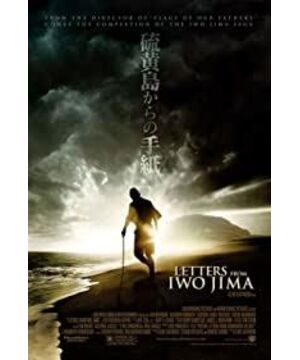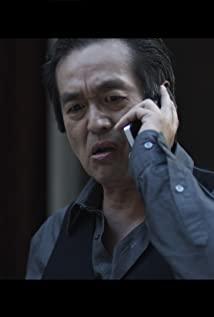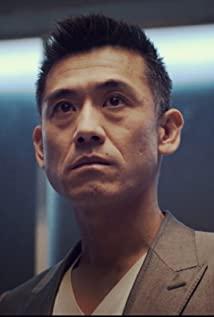More than a month ago, after reading "The Banners of Our Fathers", because I lacked a certain sense of identification with this history, I still somewhat complained about the old cowboy Eastwood's rambles and the so-called thinking about the so-called heroes; And today, more than a month later, after reading "Letter from Iwo Jima", which is the companion volume of "Fathers", I can't help but applaud. It turns out that this is the real ambition of the old cowboy this year, and it can be called the most ambitious work this year. One of the outstanding films. Of course, I personally feel that it is much more atmospheric than the remake of the best film "Infernal Affairs". The details, the rhythm of the story, and the director's techniques are used to achieve the highest level of perfection. Who made the Oscars an American Film Institute award, and how could they give you a film that tells a Japanese story? But then again, such a profound and moving film, which tells the tragic battle of Iwo Jima more than half a century ago from a Japanese perspective, was actually written by an American director. I'm afraid it's too late for the Japanese to blush. It is even more impossible to award the Japanese Film Festival Golden Kirin Award to the film.
In fact, for "Letter from Iwo Jima", our best viewing angle is neither from the perspective of Americans nor from the perspective of the Japanese, but should ignore the differences between countries and observe from the perspective of basic human affection and love . This may sound a bit mysterious, but in the final analysis, it is really from a moviegoer's viewing experience. Most of the so-called "classics" in the history of movies are the emotional focus of the story on the basic human emotions. Or basic values such as understanding of justice, or in-depth thinking on some social issues. For example, the perseverance and persistence in "Forrest Gump"; the never-give-up of hope in "The Shawshank Redemption"; all Kubrick's works can be deeply inspired at any time...Excellent Movies can always arouse our emotions and thoughts, such as "Letter from Iwo Jima". After watching it, I feel that the war itself is the culprit of everything, and everyone in the war is the victim. The differences between countries are elevated to a kind of unfamiliar and distant background, and even people forget the direct purpose of the warriors fighting, but the power of this illusory and distant existence is irresistible, and people's basic emotions are completely Be manipulated by it, then distorted or tortured. Perhaps this is the true meaning of war for each of us ordinary ordinary people.
I remember that on the train back to Beijing this year, I met a junior brother who graduated from the same high school as me. We couldn’t sleep in the middle of the night, so we started chatting, and he asked me a very serious question: Why do you think we should be patriotic? At that time, I didn't pay much attention to this issue. I just made a few metaphysical remarks. I am afraid it is a very unreliable content when I recall it now. But after reading "Letter from Iwo Jima", this question suddenly jumped back to my mind, why should people be patriotic? The American and Japanese soldiers in the film joined the army to fight a patriotic act, but are they really patriotic? Perhaps for the vast majority of ordinary people, the greater meaning of life does not exist at the level of the country, but only within the scope of the family. For an individual, the family is a real frame of reference, a background map for determining one's own position, and the meaning of each of our lives is meaningful. Perhaps it is from this perspective that the letters in this film, that is, letters from home, have such a powerful emotional shock.
Speaking of the film itself, this film is based on the family letter left by the Japanese general Tadashi Kuribayashi when he was guarding Iwo Jima. The letter truly recorded the development of the war at that time and his thoughts for his family. Japanese actor Ken Watanabe gave a wonderful performance in this film, but unfortunately he did not win any awards in the end. The other two little characters in the film, Xixiang and Shimizu, also left a deep impression on me. The full and ordinary state of the two characters, as well as the real emotional expression in the face of war, are all moving. Although the actor playing Xixiang always looks a bit like Du Wenze's "Silly Strong" :)
An emotional trigger for the film is a letter from an American soldier sam. In fact, the letter from home plays a very important role as a clue in this film. The occasional letter writing plot allows the plot and battle situation to be displayed, and at the same time reveals the character's past and inner world. This is a very normal screenwriting method, but this simple method is used just right in this film, delicate and powerful. For example, after the death of American soldier Sam, Nishi Zhong, who once won the gold medal in the Los Angeles Olympic Games, found a letter from Sam's mother from him. The content of the letter is actually nothing more than trivial family matters, as well as the family's concerns and expectations, but these simple contents sounded extremely moving in the environment at the time, even if it came from an American soldier, but at this time. At this moment, what does it matter who comes from which country? Everything is not important, but the longing for family is the common emotion of human beings regardless of country, historical period, and race. However, the emotion was temporary. The sound of the cannon recalled that everyone immediately re-entered the war, emotions were put aside again, and national interests were controlled over personal emotions, which once again became the virtual and distant goal that determined everything. Ordinary people fight to the death. Sad, pathetic. From the screenwriter's point of view, this letter-reading setting can't help but relieve and buffer emotions emotionally, and easily elevates the emotional meaning of the film to a great level.
These days, when I read the film magazines in the early days of the founding of the People's Republic of China, my eyes are full of ideologically directed film stories and slogan documents. These things are actually the product of being framed within the country's ideology, while personal feelings and value choices are completely lost. There are no traces of them, and these "things" are too narrow and simple in terms of art compared to "works" such as "Letters from Iwo Jima", in addition to their historical research value.
I wait, one day in the future, when we hear stories about history, we will be able to see traces of "people".
View more about Letters from Iwo Jima reviews











